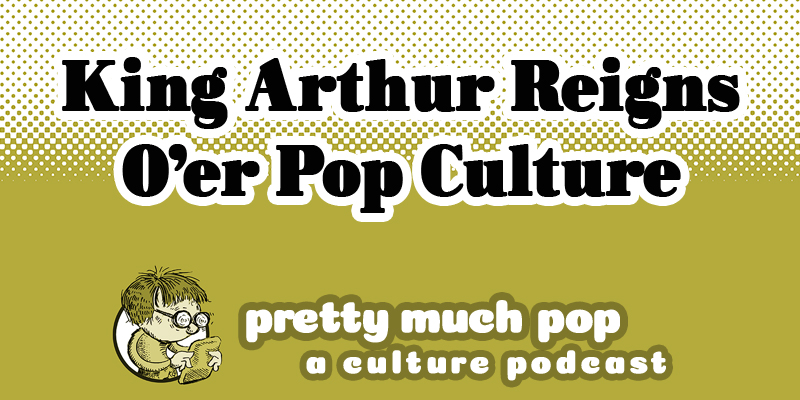King Arthur in Film: Our Most Enduring Popular Entertainment Franchise? Pretty Much Pop: A Culture Podcast #104

With the recent theatrical release of The Green Knight, your Pretty Much Pop host Mark Linsenmayer, returning host Brian Hirt, plus Den of Geek’s David Crow and the very British Al Baker consider the range of cinematic Arthuriana, including Excalibur (1981), Camelot (1967), King Arthur (2004), King Arthur: Legend of the Sword (2017), First Knight (1995), Sword of the Valiant (1983), Sir Gawain and the Green Knight (1973), and Monty Python and the Holy Grail (1975).
Arthuriana encompasses numerous (sometimes contradicting) stories that accrued and evolved for nearly 1000 years after the probable existence of the unknown person who was the historical source for the character before the 14th century poem (author unknown) Sir Gawain and the Green Knight, and then in the 15th century Sir Thomas Malory wrote Le Morte d’Arthur, which provided the template for well-known modern retellings like T.H. White’s The Once and Future King (1958).
The length and complexity of this mythology makes a single film problematic, with most settling on the love triangle between Arthur, Lancelot, and Guinevere leading to Camelot’s downfall. Multiple TV treatments have tried to do it justice, and if Guy Ritchie’s King Arthur: Legend of the Sword had been a box office success, then we’d currently be seeing multiple films in an Arthurian cinematic universe. By picking a smaller story and not trying too hard to tie it to King Arthur (who appears but is not named), The Green Knight is able to be more creative in painting and updating the strange story of Sir Gawain, who in previous cinematic outings (including Sword of the Valiant where Sean Connery played The Green Knight) involved Gawain involved in a series of nonsensical adventures far removed from the events told in the original poem.
We talk through characterization in a mythic story, stylizing the epic (how much violence? how weird?), its status as public domain material (like Robin Hood and Sherlock Holmes), and the moral lesson of the original Gawain poem and what director David Lowery did with that for the new film. Is the new film actually enjoyable, or just carefully thought through and artfully shot? Note that we don’t spoil anything significant about The Green Knight until the last ten minutes, so it’s fine if you haven’t seen it (Al hadn’t either).
Here are song articles by David Crow on our topic:
- “King Arthur in the 21st Century: A Tale of Two Box Office Disappointments“
- “The Green Knight Review: A King Arthur Movie Imbued with Dark Magic“
- “The Green Knight Ending Explained“
- “How Lord of the Rings Influenced The Green Knight“
Other articles we used to prep for this included:
- “15 King Arthur Movies, Ranked by Insufferableness” by Tricia Ennis
- “The Ten Greatest King Arthur (and Arthur-Adjacent) Adaptations, Ranked” by Thomas Barrie
- “Why Are There No Good King Arthur Movies” by Scott Telek
- “The History of King Arthur on Film” by Christopher McKittrick
- “5 Ways David Lowery Boldly Changed “The Green Knight”’s Arthurian Source (and Made Camelot Relevant Again)” by Alisha Grauso
- “The Green Knight, Failure, and Green, Green Growth” by Jacob Oller
- “The Timeless Allure of King Arthur’s Gawain: ‘He feels like the first modern protagonist’” by Xan Brooks
- “5 Reasons Guy Ritchie’s ‘King Arthur: Legend of the Sword’ Actually Rules” by Matt Rooney
The YouTube versions of the source material that Mark listened to are here and here, and the relevant Great Courses offering is here.
This episode includes bonus discussion you can access by supporting the podcast at patreon.com/prettymuchpop. This podcast is part of the Partially Examined Life podcast network.
Pretty Much Pop: A Culture Podcast is the first podcast curated by Open Culture. Browse all Pretty Much Pop posts.
King Arthur in Film: Our Most Enduring Popular Entertainment Franchise? Pretty Much Pop: A Culture Podcast #104 is a post from: Open Culture. Follow us on Facebook and Twitter, or get our Daily Email. And don't miss our big collections of Free Online Courses, Free Online Movies, Free eBooks, Free Audio Books, Free Foreign Language Lessons, and MOOCs.
from Open Culture https://ift.tt/3Ad0bOz
via Ilumina
Comments
Post a Comment